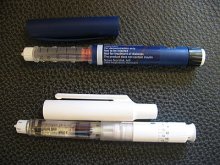Alzheimer's is diabetes of the brain?


A study published today in the Proceedings of the National Academy of Sciences by researchers at Northwestern University (Go Wildcats) states that insulin signaling keeps amyloid beta from binding into plaques. (Pictured are insulin injection systems known as insulin pens from Wikipedia.)
This is "a protective mechanism that naturally shields synapses" from deterioration, the study found.
Specifically, cells from the hippocampus treated with insulin and an anti-diabetes drug that promotes use of insulin became much less susceptible to damage from the amyloid beta plaques whose role is considered critical in development of Alzheimer's disease.
Proper insulin regulation, in other words, keeps plaques from forming.
Charities involved in fighting the disease hope that drugs now used against diabetes could now also be used against Alzheimer's. That may be too much to ask for at this time, but it is consistent with studies showing diabetes impacts the whole cardiovascular system, and that there are links between brain disease and heart disease.
That's not all. A Swedish study shows that those who get Type II diabetes in mid-life greatly increase their chances of developing Alzheimer's later on.
Diabetes is a disease marked by an inability to regulate blood sugar and impaired production of insulin by the body. Taking insulin causes blood sugar levels to drop. Other diabetes drugs promote this natural production of insulin.
What these studies point to is another use of insulin by the body, the prevention of plaque formation.
Difficulty in regulating blood sugar, it should be noted, is a natural part of aging. I recently found that my own symptoms of exhaustion were not produced by the hypertension I was treating, but by hypoglycemia -- low blood sugar. A little candy cured me.
So rather than just seeing Alzheimer's as diabetes, or heart disease, what we may be finding is that conditions involving cholesterol, blood pressure, and sugar should not be seen in isolation, but examined more closely as we age to prevent rather than cure these deadly contagions.